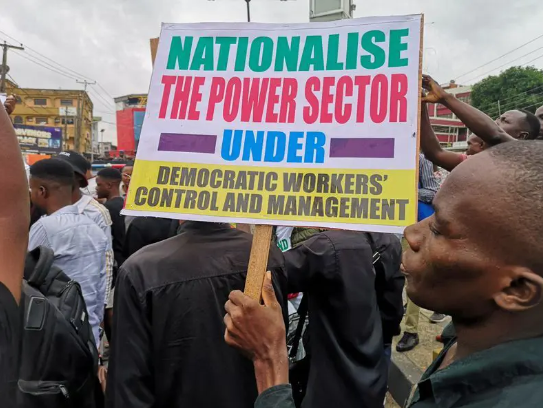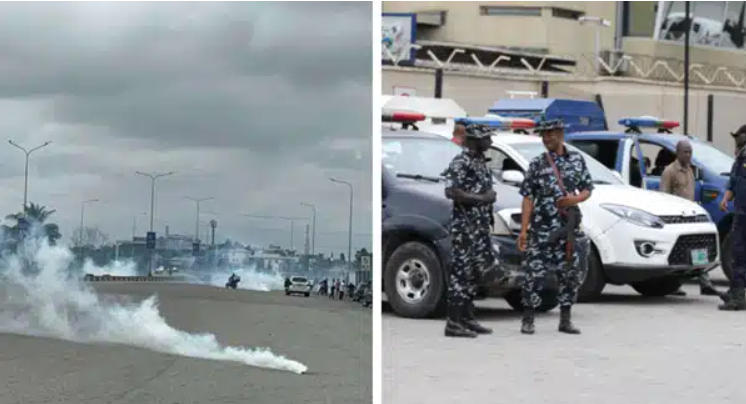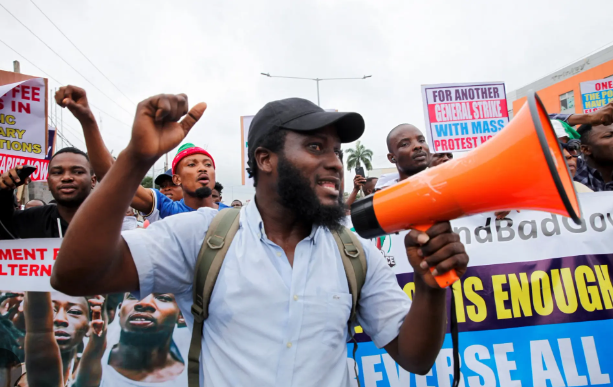By Joke Kujenya
NATIONWIDE PROTESTS are ongoing across Nigeria as citizens rally against economic hardship and government policies.
Demonstrators in various cities gathered to voice their discontent over fuel subsidy removal, inflation, and poor governance.
The protests were fueled by rising inflation, which has reached 34 percent due to subsidy removal and the floating of the naira.
The cost of basic items has soared, making them unaffordable for many Nigerians.
Social media played a crucial role in mobilizing the protests, with hashtags like #EndBadGovernance trending and gaining widespread support among young Nigerians.
August 1 in Kaduna State, protesters began their march at the NEPA roundabout, chanting slogans like “End Fuel Subsidy Now” and “End Bad Governance.”
Initially peaceful, the protest turned violent as some participants burned tires and threw stones near the Government House.
Police responded with tear gas to disperse the turmoil.

Similar scenes unfolded in other parts of the country.
In Benin, Edo State, protesters assembled at King Square, voicing their demands for better economic conditions.
In Asaba, Delta State, the police used tear gas to disperse demonstrators at the Inter Bau roundabout.
Despite the crackdown, protesters in Bauchi regrouped and attempted to advance towards the Government House after being dispersed at the Emir’s Palace.
Roads leading to the Government House were barricaded, and movement in the area was restricted.
Port Harcourt, the capital of Rivers State, witnessed a significant impact as the city turned into a ghost town on the first day of the nationwide protest.
Many usually bustling areas were deserted as most residents stayed indoors.
Meanwhile, Bayelsa’s Governor Douye Diri commended the youth in his state for abstaining from the national protest.
He acknowledged the economic challenges but urged for patience and dialogue.
Fear of Hoodlums’ Hijacks
Authorities had warned that the protests could be hijacked by criminals and urged organizers to call them off.
However, the Take It Back Movement, a key organizer, insisted on proceeding.
Their demands include ‘reinstating fuel subsidies’, ‘addressing food shortages and unemployment’, and ‘curbing government waste’.
They also call for reforms in the Independent National Electoral Commission (INEC) and the Economic and Financial Crimes Commission (EFCC) to strengthen the fight against corruption.
Banks Not Operating
The protests led to the closure of banks and financial institutions nationwide.
Employees were advised to stay home for safety, with banks urging customers to use digital channels for transactions.
Leadway Pensure, a Pension Fund Administrator, was reported to have informed customers of office closures and recommended using online services.
Meristem Securities Limited also announced the closure of its offices in Lagos, Port Harcourt, and Abuja, citing safety concerns.
Banks’ Union Decision
Anthony Abakpa, President of the National Union of Banks, Insurance, and Financial Institutions Employees stated that banks would monitor the situation closely.
He emphasized that any decision to close operations would require approval from the Central Bank of Nigeria.
Abakpa advised bank employees to exercise caution and prioritize their safety.
From various states, commentators said the protests reflect the growing frustration among Nigerians over economic policies and governance issues.
Youths with Hazardous Arms
Meanwhile, The News Agency of Nigeria (NAN) reports that a large number of youths, armed with dangerous weapons, have taken over major roads in Kano metropolis.
The situation has caused significant disruptions, with shops closed and a filling station along with a Rufaida shop set ablaze in Hotoro quarters.
Some residents have urged authorities to take immediate action to restore order and protect lives and property.
Alhaji Isa Musa, a resident of Charanchi in Gwale Local Government Area, described the current situation as a serious threat to humanity.
He called for additional police personnel to be deployed to address the deteriorating security situation and restore order.
“The situation requires prompt action to ensure the safety and security of residents, protect property, and maintain law and order in the metropolis,” he said.
Meanwhile, in Calabar, Cross River State, activities came to a standstill on Thursday as the nationwide protest began.
The protest is scheduled to run from August 1 to August 10.
NAN reports that the Nigeria Police were seen patrolling the streets in large numbers.
Although there were no visible signs of protesters, banks, markets, and other businesses remained closed, with the exception of some medical facilities.
Due to the lack of commercial vehicles, Miss Cynthia Atoe, a health worker, said she was stranded at her bus stop for a long time.
“I could see both sides of the road to the left and right because Marian Road where I stood was totally deserted.
“When I finally saw a bus willing to take me halfway, it was a short trip of fear as we were constantly on the lookout for any strange activity on the road,” she said.
Also, Mrs. Maria Ejom expressed frustration after finding all the shops closed when she went out to get a call card. She needed to make an urgent call but was unable to do so.
A mini bus driver, Mr Paul Okechukwu, who operates the popular Watt Market route, decided to park his vehicle in memory of the 2020 #EndSARS protest and the subsequent vandalism.
NAN also observed that security officials were stationed at various junctions throughout the city.
Police Curb Violence in Lekki
Also in Lagos, police dispersed protesters with teargas canisters at the Lekki Tollgate.

A youth-led nationwide protest against the soaring cost of living began on Thursday.
In Lagos, Nigeria’s commercial capital, protesters marched from Ikeja, Ojota, and Lekki, with other pockets of protests across the metropolis.
The police had warned demonstrators against converging on the tollgate, the site of a “massacre” during the 2020 anti-police brutality protests.
On July 30, the Lagos state government secured a court order restricting protesters to the Gani Fawehinmi Freedom Park in Ojota and Peace Park in Ketu.
Emmanuel Ogundare, a judge at the Lagos High Court, had granted the restriction order following an ex parte application by Lawal Pedro, the state’s Attorney-General.
In Abuja, Nigeria’s capital city, police also fired teargas at protesters.
Inflation has spiraled since President Bola Tinubu ended the petrol subsidy regime and unified the forex windows in 2023.
Protesters gathered at the Lekki Tollgate on Thursday to demand an end to bad governance.
The area was heavily fortified with security personnel deployed to maintain order.
Policemen tear-gassed the defiant #EndBadGovernance protesters around 11 am.
The Lekki Tollgate, symbolic for civil demonstrations following the #EndSARS protests of 2020, initially saw no activity in the morning.
However, protesters soon arrived, bearing placards and chanting solidarity songs.
“We just want the country to be stable. People are hungry. People are dying. We are not coming to fight; we only want the government to do something,” a female protester said.
Scores of security agents, including policemen, soldiers, officers of the Nigeria Security and Civil Defence Corps (NSCDC), and the Lagos State Neighbourhood Safety Agency, were on the ground.
They informed the demonstrators of the court order restricting their gathering to the Gani Fawehinmi Park in Ojota and the Peace Park in Ketu.
The protesters rejected the relocation and continued their demonstrations until dispersed by police teargas.
The nationwide protests against economic hardship, propagated on social media, started on Thursday, August 1, 2024, and are scheduled to stretch till August 10 across all states of the Federation and Abuja.
Prices of food and basic commodities have skyrocketed, as Nigerians battle one of the country’s worst inflation rates and economic crises, sparked by the government’s twin policies of petrol subsidy removal and unification of forex windows.
The police, military, and the Department of State Services had warned against Kenya-styled protests.
Politicians, also fearing a repeat of the EndSARS demonstrations of October 2020, appealed to youths to shelve the rallies, but the young people remained unfazed.





